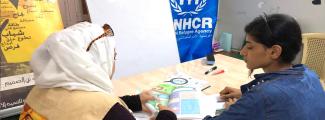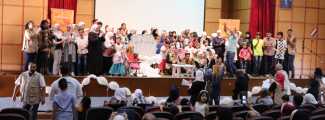Fatima and Aisha, nine-year-old twins, fled with their family from eastern rural Aleppo to Jaramana city in Damascus. They were stripped of all what they possess, including their education, safety, friends, and the foundations that provide the twins’ most basic rights, and were left with nothing but diffidence.
After the SSSD’s ORV team spotted the twins, they invited their parents to register at the Athr Alfarasha Community Center in Jaramana. There, the Child Protection case manager met with the parents and got more informed of Fatima and Aisha’s situation, who both suffered from deprivation. "Even though the school is for free, I can’t afford registering them.
I used to be a sewing teacher and had a shop, now I am incapable of even buying them a biscuit!”, said the father.
The case manager held individual sessions with both children, as an essential step for a comprehensive and in-depth evaluation of their situation. She then developed an intervention plan tailored for the twins, in partnership with them and their father.
Fatima and her sister were accordingly integrated into the Mentoring Programme group, and referred to the Educational Department and the appropriate events and campaigns.
Also, both children will be enrolled in school as of the next academic year. Since Child Protection works in parallel with the child and his caregiver, the father was referred to the Small Business Grants Programme so that he could return to his sewing career, thereby ensuring the basic needs of his family, and especially his daughters.
After a period of Fatima and Aisha joining the activities, the facilitators noticed a significant improvement in their ability to discuss and express themselves. One of them expressed herself by saying:” Oh how I wish father had brought us to you way before.
When my sister and I come back home and hang our drawings or anything else we have made on the wall, we feel so proud of ourselves once we see our guests’ reactions and how impressed they are with our work.
Our joy is beyond words, we are so excited to go to school and carry backpacks like all the other children.”
Fatima and Aisha’s father finally got the approval for his project. He expressed his joy by saying:” I feel like a young boy reborn once again. My love for life and ambition both came back to me.
I became able to think about what I can give to my family. Everyone at home is laughing once again. Additionally, Fatima and Aisha got back the father they deserved: a supporting, strong, protective dad they had lost before.”




